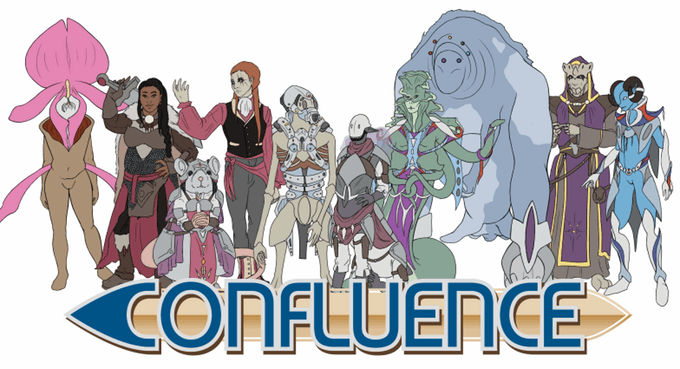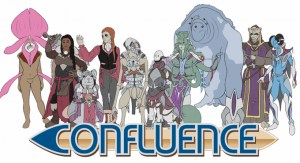By Laya Liebeseller, Anthropology PhD Candidate
This is the origin story of “Doctors and Dungeon Masters,” a table-top roleplaying show on the Serious Play Twitch Channel, which had its first episode in August 2017, the month after our summer of Confluence ended. Originally, it was lovingly called “A Podcast with Pictures” because we did not have the camera set up yet. You can watch “Doctors and Dungeon Masters” now. A new campaign is starting soon, and the final episode of “Doctors and Dungeon Masters: Aftermath: A Dragonlance Story” will be airing in early February.
I will never forget the conversation that transpired on May 29 of 2017. I had just graduated from my Master’s Program in Anthropology at UW-Milwaukee earlier that month and was moving on to become a PhD student in the same department. I was fresh off the line and still glowing. It was a rare summer of freedom, in which I caught up on the sleep I sorely missed during the flurry of thesis writing. I had made friends with the professor I TA’d for during the previous Spring, Dr. Krista-Lee Malone, a fellow anthropologist and game scholar, who had introduced me to the Serious Play troupe, now the Digital Cultures Collaboratory with the Center for 21st Century Studies.
She had been looking to start a tabletop role-playing game (TTRPG) with our troupe mates, as a sort of bonding activity, as at this point, we were relatively unfamiliar with each other and she had asked me to be the Game Master (GM). I have been GMing since 2009 and since I had little else to do that summer, had said yes, several weeks prior. Around the same time a friend of mine, Dane Asmund, was playtesting his own TTRPG, Confluence, and was looking for playtesters. I thought this would be the perfect game to play with Serious Play over the course of the summer. It was something fun that we could all engage with.
On May 29, Krista-Lee and I are speaking generally about the game. She had of course always referred to everyone she had invited to play by their first names (Nathan, Kris, Thomas, and of course the two of us), as is a common phenomenon in game and friend groups. We were talking about the game when all of sudden something in my own brain clicked into place, and rather randomly in the middle of the conversation I said, “Wait, were you talking about Dr. Malaby? Thomas Malaby?” Dr. Malaby was, and still is, my advisor and an active faculty member of Serious Play since its founding in 2013. She laughs, of course, at my slightly shocked tone and says, “Yes, Thomas Malaby.”
It took my own brain (what felt like several hours) several seconds to catchup with what I had already agreed to.
I would be the GM for my advisor.
…
My advisor would be my player.
…..
I was going to be in charge of game my advisor was playing in.
……….
I was apprehensive, at first, because power dynamics are real, and within academia we take advisor-advisee boundary maintenance seriously even if we rarely talk about it. Navigating through what happens when your advisor is a player at your table and you, the Graduate Student, are the Game Master is not without its tribulations.
In the beginning I felt like I had to walk a fine line, unsure of how to proceed through the flip in power dynamics. I was nervous because when you play, you perform, which by itself can sometimes be overwhelming. When you GM for your advisor, there is another level of student performance tacked-on, and when you play on Twitch (which would come later), you are then also performing for an outside audience. Ultimately, and especially in the beginning, this produced a lot of anxiety for me. I was nervous the story would not be good enough, that the players would not mesh, and every potential character death loomed over my head. There is always the chance that your world, which as the GM you represent, kills one of your players’ characters. And as a future article of mine will explore, you never know exactly how character death will be taken, or how it might change interpersonal dynamics in any gaming group. However, it can also be ridiculously fun.
Telling your advisor, “No, you can’t do that,” is an interesting experience, one I wish I could suggest to everyone, but won’t.
There is something about being in a play space, and feeling like you can be goofy, or awkward, or weird with the other players at the table that helps to create a sense of community, and breaks down normative boundaries, which I do not think is exclusive to tabletop gaming. There is something about watching your professor fumble and pray to the Dice Gods for a better roll next time, that humanizes the professor in a way that hadn’t happened yet, as I was still, largely, a wide-eyed, bushytailed, academic newbie, still high off seeing my thesis printed for the very first time. It created a new model of interaction, which in some ways complicated the advisor-advisee relationship, and in others it created an ease that wasn’t there before. More, it did what Krista-Lee had hoped it would, and brought the entire group together, and started the formation of a camaraderie which has only grown as we have found other avenues to strengthen that bond.
I will say, very seriously, that I still think I am lucky. Lucky that I had Nathan, Kris, and Krista-Lee, playing with me, some of the best players for whom I have had a chance to GM. Lucky that nothing went massively wrong, as I still believe that the presumption of safety we lend to TTRPGs is sometimes misplaced. Friendships are ruined, bridges burned, and communities broken at those tables. Playing together can show where the hidden alliances lie, deepen interpersonal fractures, and force grievances to the surface in ways some people often aren’t ready for. Play is a risk that often goes extraordinarily well, as it did in this case, but a positive outcome is not guaranteed. I was lucky that I had 2 doctors, a PhD Candidate, and an amazing librarian willing to sit down with a recently graduated Master’s student as an equal, and lucky to have an advisor who knows deeply the power of fun.
Praise be to the Dice Gods who make the imaginary real. Play on.

